Analyzing Unconditional Positive Regard in Social Work Practice
VerifiedAdded on 2020/11/12
|6
|1155
|89
Essay
AI Summary
This essay delves into the concept of unconditional positive regard (UPR) within the field of social work. It begins by defining UPR as a core principle developed by Carl Rogers, emphasizing acceptance and support without judgment. The essay explores how social workers align with this person-centered approach and its positive impact on client relationships. It then examines the challenges and ethical considerations associated with UPR, including limitations in specific contexts like child protection and the influence of societal stereotypes. The analysis considers various perspectives, highlighting both the benefits of UPR in fostering open communication and the need for ethical boundaries. The conclusion underscores the importance of balancing UPR with professional ethical codes to ensure effective and responsible social work practice.

SOCIAL WORK
Paraphrase This Document
Need a fresh take? Get an instant paraphrase of this document with our AI Paraphraser
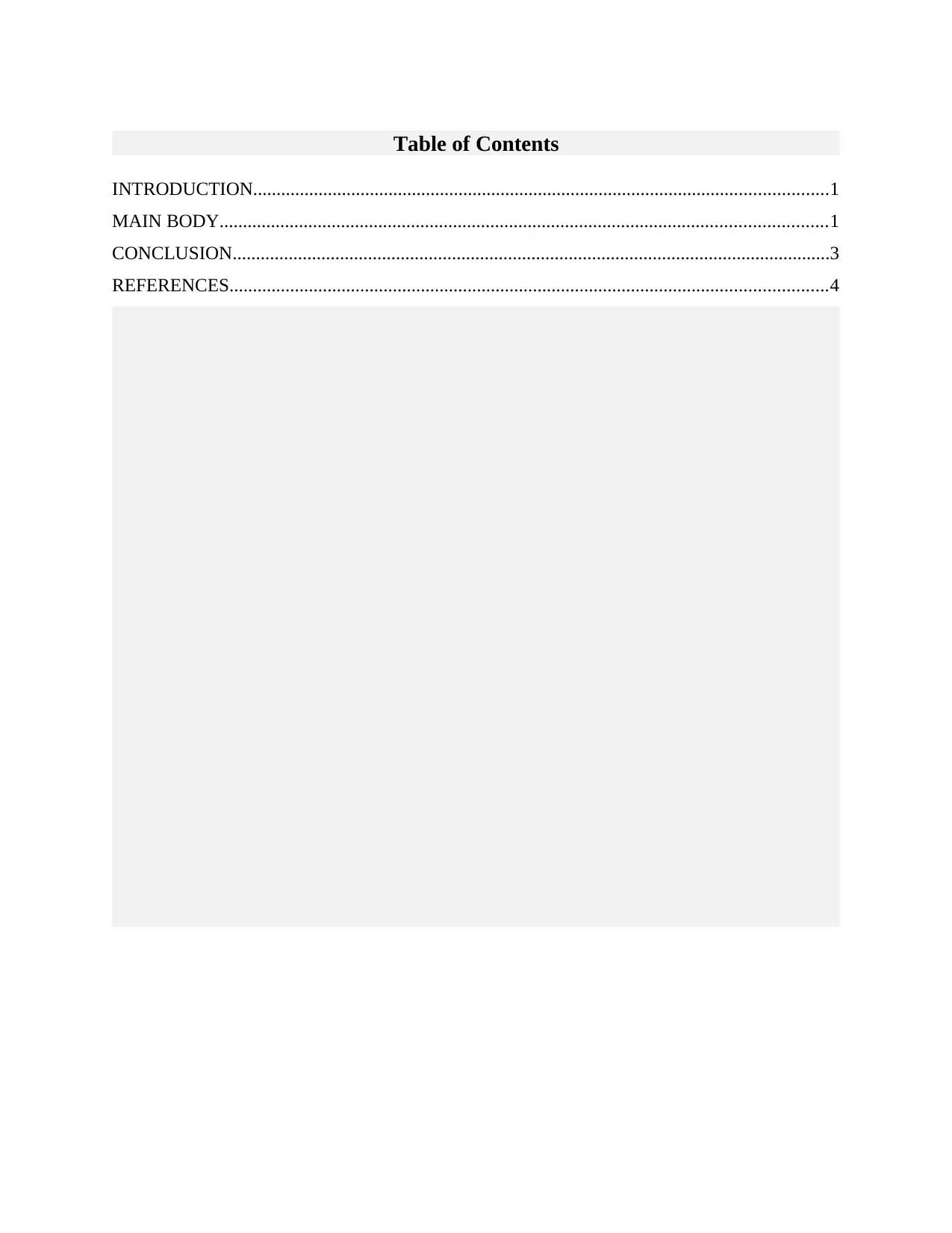
Table of Contents
INTRODUCTION...........................................................................................................................1
MAIN BODY..................................................................................................................................1
CONCLUSION................................................................................................................................3
REFERENCES................................................................................................................................4
INTRODUCTION...........................................................................................................................1
MAIN BODY..................................................................................................................................1
CONCLUSION................................................................................................................................3
REFERENCES................................................................................................................................4
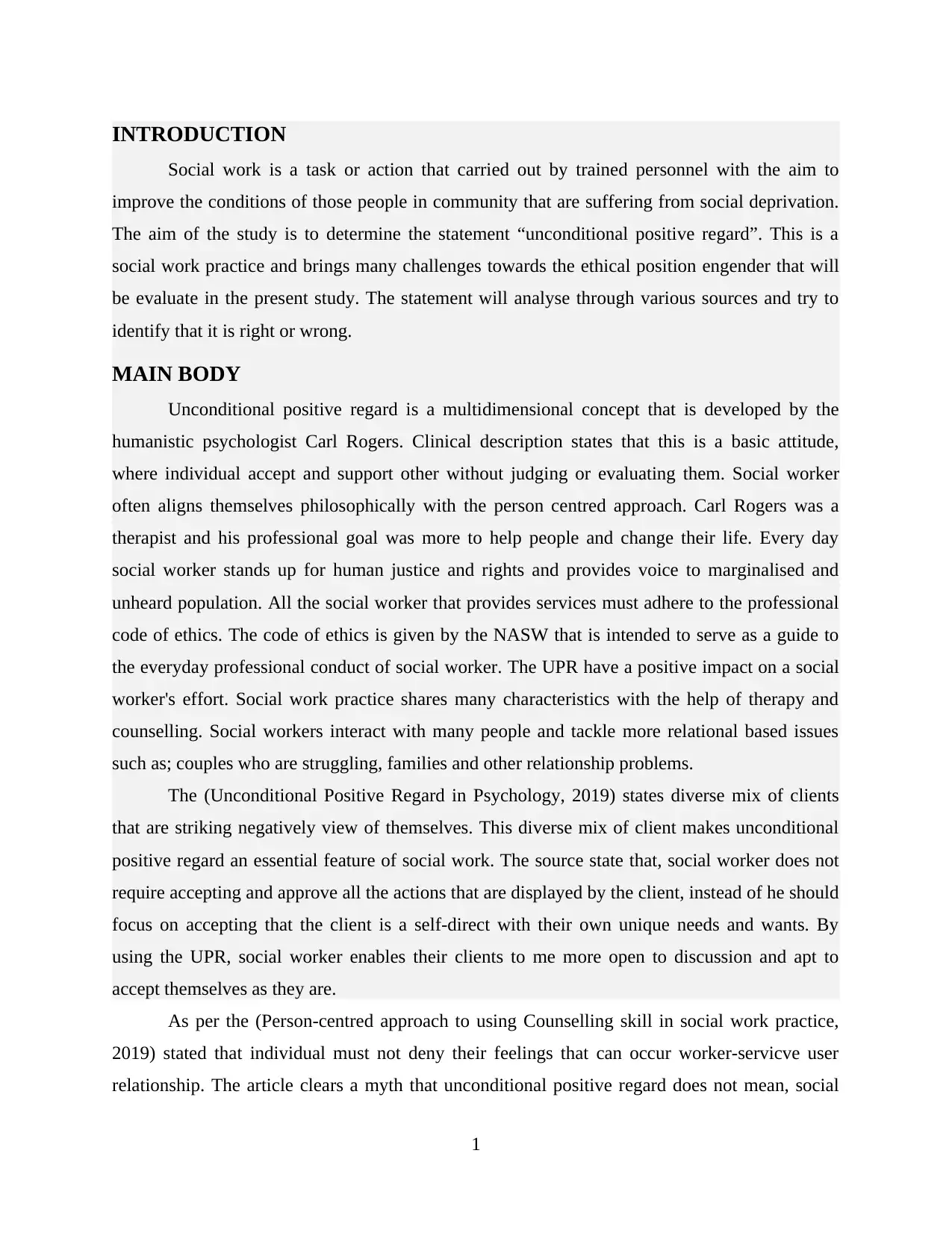
INTRODUCTION
Social work is a task or action that carried out by trained personnel with the aim to
improve the conditions of those people in community that are suffering from social deprivation.
The aim of the study is to determine the statement “unconditional positive regard”. This is a
social work practice and brings many challenges towards the ethical position engender that will
be evaluate in the present study. The statement will analyse through various sources and try to
identify that it is right or wrong.
MAIN BODY
Unconditional positive regard is a multidimensional concept that is developed by the
humanistic psychologist Carl Rogers. Clinical description states that this is a basic attitude,
where individual accept and support other without judging or evaluating them. Social worker
often aligns themselves philosophically with the person centred approach. Carl Rogers was a
therapist and his professional goal was more to help people and change their life. Every day
social worker stands up for human justice and rights and provides voice to marginalised and
unheard population. All the social worker that provides services must adhere to the professional
code of ethics. The code of ethics is given by the NASW that is intended to serve as a guide to
the everyday professional conduct of social worker. The UPR have a positive impact on a social
worker's effort. Social work practice shares many characteristics with the help of therapy and
counselling. Social workers interact with many people and tackle more relational based issues
such as; couples who are struggling, families and other relationship problems.
The (Unconditional Positive Regard in Psychology, 2019) states diverse mix of clients
that are striking negatively view of themselves. This diverse mix of client makes unconditional
positive regard an essential feature of social work. The source state that, social worker does not
require accepting and approve all the actions that are displayed by the client, instead of he should
focus on accepting that the client is a self-direct with their own unique needs and wants. By
using the UPR, social worker enables their clients to me more open to discussion and apt to
accept themselves as they are.
As per the (Person-centred approach to using Counselling skill in social work practice,
2019) stated that individual must not deny their feelings that can occur worker-servicve user
relationship. The article clears a myth that unconditional positive regard does not mean, social
1
Social work is a task or action that carried out by trained personnel with the aim to
improve the conditions of those people in community that are suffering from social deprivation.
The aim of the study is to determine the statement “unconditional positive regard”. This is a
social work practice and brings many challenges towards the ethical position engender that will
be evaluate in the present study. The statement will analyse through various sources and try to
identify that it is right or wrong.
MAIN BODY
Unconditional positive regard is a multidimensional concept that is developed by the
humanistic psychologist Carl Rogers. Clinical description states that this is a basic attitude,
where individual accept and support other without judging or evaluating them. Social worker
often aligns themselves philosophically with the person centred approach. Carl Rogers was a
therapist and his professional goal was more to help people and change their life. Every day
social worker stands up for human justice and rights and provides voice to marginalised and
unheard population. All the social worker that provides services must adhere to the professional
code of ethics. The code of ethics is given by the NASW that is intended to serve as a guide to
the everyday professional conduct of social worker. The UPR have a positive impact on a social
worker's effort. Social work practice shares many characteristics with the help of therapy and
counselling. Social workers interact with many people and tackle more relational based issues
such as; couples who are struggling, families and other relationship problems.
The (Unconditional Positive Regard in Psychology, 2019) states diverse mix of clients
that are striking negatively view of themselves. This diverse mix of client makes unconditional
positive regard an essential feature of social work. The source state that, social worker does not
require accepting and approve all the actions that are displayed by the client, instead of he should
focus on accepting that the client is a self-direct with their own unique needs and wants. By
using the UPR, social worker enables their clients to me more open to discussion and apt to
accept themselves as they are.
As per the (Person-centred approach to using Counselling skill in social work practice,
2019) stated that individual must not deny their feelings that can occur worker-servicve user
relationship. The article clears a myth that unconditional positive regard does not mean, social
1
⊘ This is a preview!⊘
Do you want full access?
Subscribe today to unlock all pages.

Trusted by 1+ million students worldwide
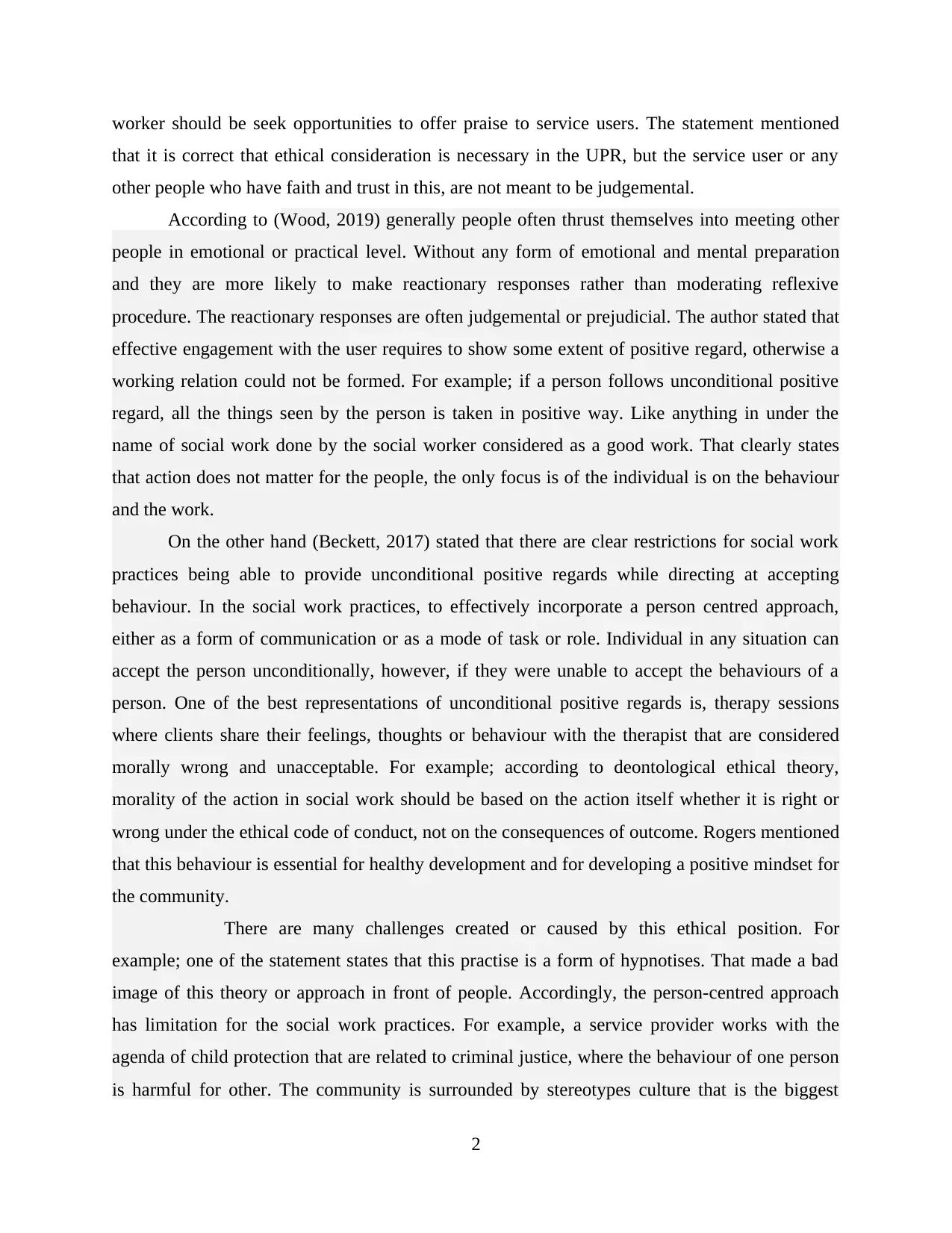
worker should be seek opportunities to offer praise to service users. The statement mentioned
that it is correct that ethical consideration is necessary in the UPR, but the service user or any
other people who have faith and trust in this, are not meant to be judgemental.
According to (Wood, 2019) generally people often thrust themselves into meeting other
people in emotional or practical level. Without any form of emotional and mental preparation
and they are more likely to make reactionary responses rather than moderating reflexive
procedure. The reactionary responses are often judgemental or prejudicial. The author stated that
effective engagement with the user requires to show some extent of positive regard, otherwise a
working relation could not be formed. For example; if a person follows unconditional positive
regard, all the things seen by the person is taken in positive way. Like anything in under the
name of social work done by the social worker considered as a good work. That clearly states
that action does not matter for the people, the only focus is of the individual is on the behaviour
and the work.
On the other hand (Beckett, 2017) stated that there are clear restrictions for social work
practices being able to provide unconditional positive regards while directing at accepting
behaviour. In the social work practices, to effectively incorporate a person centred approach,
either as a form of communication or as a mode of task or role. Individual in any situation can
accept the person unconditionally, however, if they were unable to accept the behaviours of a
person. One of the best representations of unconditional positive regards is, therapy sessions
where clients share their feelings, thoughts or behaviour with the therapist that are considered
morally wrong and unacceptable. For example; according to deontological ethical theory,
morality of the action in social work should be based on the action itself whether it is right or
wrong under the ethical code of conduct, not on the consequences of outcome. Rogers mentioned
that this behaviour is essential for healthy development and for developing a positive mindset for
the community.
There are many challenges created or caused by this ethical position. For
example; one of the statement states that this practise is a form of hypnotises. That made a bad
image of this theory or approach in front of people. Accordingly, the person-centred approach
has limitation for the social work practices. For example, a service provider works with the
agenda of child protection that are related to criminal justice, where the behaviour of one person
is harmful for other. The community is surrounded by stereotypes culture that is the biggest
2
that it is correct that ethical consideration is necessary in the UPR, but the service user or any
other people who have faith and trust in this, are not meant to be judgemental.
According to (Wood, 2019) generally people often thrust themselves into meeting other
people in emotional or practical level. Without any form of emotional and mental preparation
and they are more likely to make reactionary responses rather than moderating reflexive
procedure. The reactionary responses are often judgemental or prejudicial. The author stated that
effective engagement with the user requires to show some extent of positive regard, otherwise a
working relation could not be formed. For example; if a person follows unconditional positive
regard, all the things seen by the person is taken in positive way. Like anything in under the
name of social work done by the social worker considered as a good work. That clearly states
that action does not matter for the people, the only focus is of the individual is on the behaviour
and the work.
On the other hand (Beckett, 2017) stated that there are clear restrictions for social work
practices being able to provide unconditional positive regards while directing at accepting
behaviour. In the social work practices, to effectively incorporate a person centred approach,
either as a form of communication or as a mode of task or role. Individual in any situation can
accept the person unconditionally, however, if they were unable to accept the behaviours of a
person. One of the best representations of unconditional positive regards is, therapy sessions
where clients share their feelings, thoughts or behaviour with the therapist that are considered
morally wrong and unacceptable. For example; according to deontological ethical theory,
morality of the action in social work should be based on the action itself whether it is right or
wrong under the ethical code of conduct, not on the consequences of outcome. Rogers mentioned
that this behaviour is essential for healthy development and for developing a positive mindset for
the community.
There are many challenges created or caused by this ethical position. For
example; one of the statement states that this practise is a form of hypnotises. That made a bad
image of this theory or approach in front of people. Accordingly, the person-centred approach
has limitation for the social work practices. For example, a service provider works with the
agenda of child protection that are related to criminal justice, where the behaviour of one person
is harmful for other. The community is surrounded by stereotypes culture that is the biggest
2
Paraphrase This Document
Need a fresh take? Get an instant paraphrase of this document with our AI Paraphraser
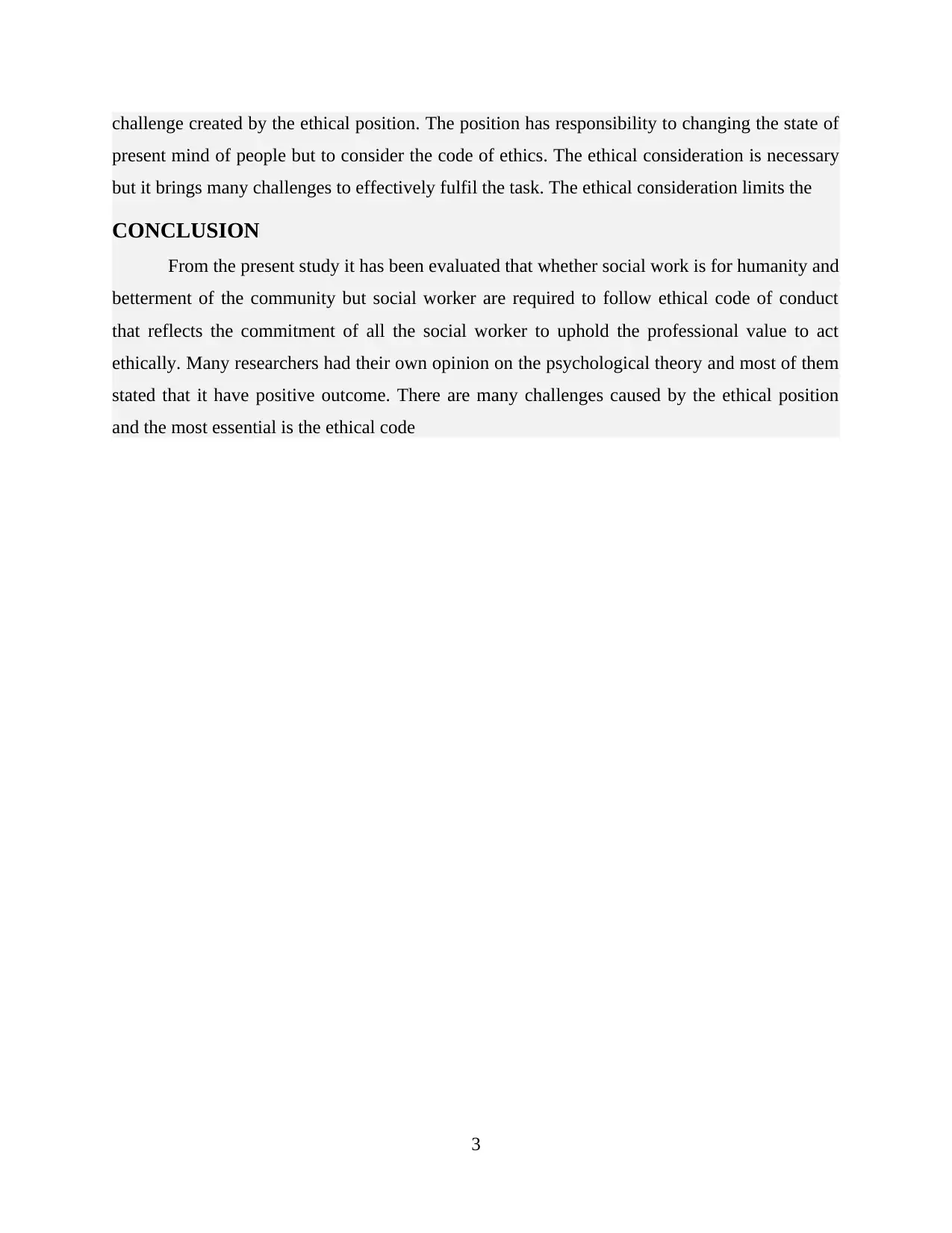
challenge created by the ethical position. The position has responsibility to changing the state of
present mind of people but to consider the code of ethics. The ethical consideration is necessary
but it brings many challenges to effectively fulfil the task. The ethical consideration limits the
CONCLUSION
From the present study it has been evaluated that whether social work is for humanity and
betterment of the community but social worker are required to follow ethical code of conduct
that reflects the commitment of all the social worker to uphold the professional value to act
ethically. Many researchers had their own opinion on the psychological theory and most of them
stated that it have positive outcome. There are many challenges caused by the ethical position
and the most essential is the ethical code
3
present mind of people but to consider the code of ethics. The ethical consideration is necessary
but it brings many challenges to effectively fulfil the task. The ethical consideration limits the
CONCLUSION
From the present study it has been evaluated that whether social work is for humanity and
betterment of the community but social worker are required to follow ethical code of conduct
that reflects the commitment of all the social worker to uphold the professional value to act
ethically. Many researchers had their own opinion on the psychological theory and most of them
stated that it have positive outcome. There are many challenges caused by the ethical position
and the most essential is the ethical code
3
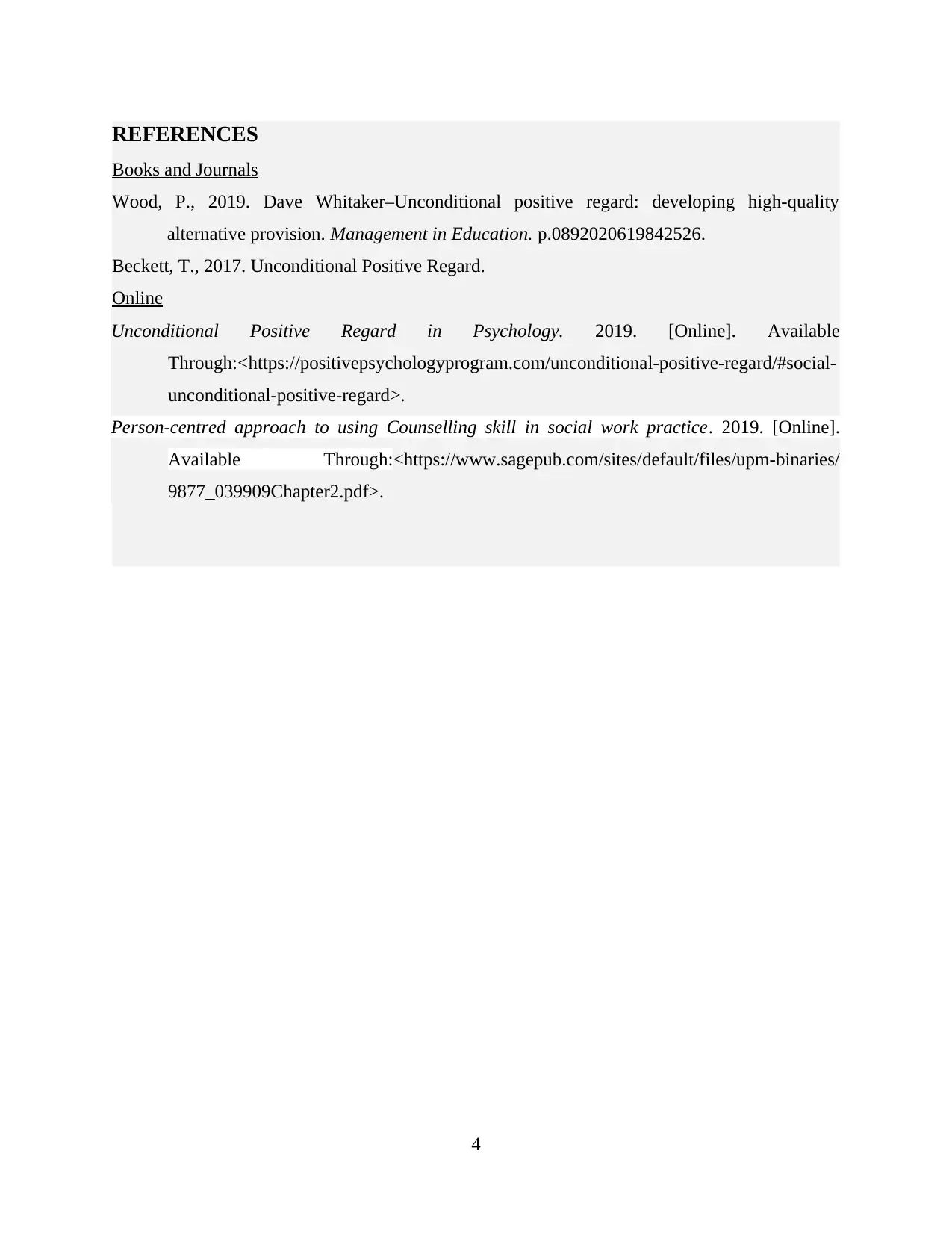
REFERENCES
Books and Journals
Wood, P., 2019. Dave Whitaker–Unconditional positive regard: developing high-quality
alternative provision. Management in Education. p.0892020619842526.
Beckett, T., 2017. Unconditional Positive Regard.
Online
Unconditional Positive Regard in Psychology. 2019. [Online]. Available
Through:<https://positivepsychologyprogram.com/unconditional-positive-regard/#social-
unconditional-positive-regard>.
Person-centred approach to using Counselling skill in social work practice. 2019. [Online].
Available Through:<https://www.sagepub.com/sites/default/files/upm-binaries/
9877_039909Chapter2.pdf>.
4
Books and Journals
Wood, P., 2019. Dave Whitaker–Unconditional positive regard: developing high-quality
alternative provision. Management in Education. p.0892020619842526.
Beckett, T., 2017. Unconditional Positive Regard.
Online
Unconditional Positive Regard in Psychology. 2019. [Online]. Available
Through:<https://positivepsychologyprogram.com/unconditional-positive-regard/#social-
unconditional-positive-regard>.
Person-centred approach to using Counselling skill in social work practice. 2019. [Online].
Available Through:<https://www.sagepub.com/sites/default/files/upm-binaries/
9877_039909Chapter2.pdf>.
4
⊘ This is a preview!⊘
Do you want full access?
Subscribe today to unlock all pages.

Trusted by 1+ million students worldwide
1 out of 6
Related Documents
Your All-in-One AI-Powered Toolkit for Academic Success.
+13062052269
info@desklib.com
Available 24*7 on WhatsApp / Email
![[object Object]](/_next/static/media/star-bottom.7253800d.svg)
Unlock your academic potential
Copyright © 2020–2026 A2Z Services. All Rights Reserved. Developed and managed by ZUCOL.




